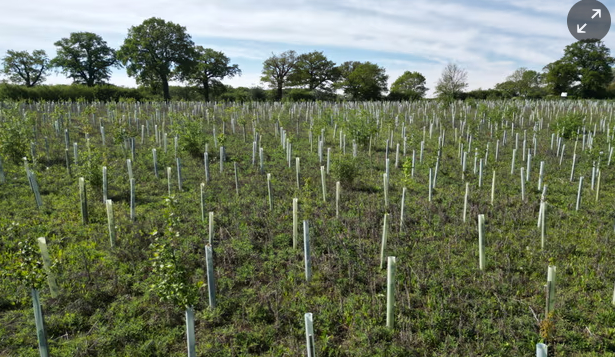June 21, 2025 | 13:38 GMT +7
June 21, 2025 | 13:38 GMT +7
Hotline: 0913.378.918
June 21, 2025 | 13:38 GMT +7
Hotline: 0913.378.918

Reforestation projects sold as part of carbon markets can now be more easily monitored because of satellites. Photograph: Richard Newstead.
For the next two weeks, countries will gather on the shores of the Caspian Sea in Baku, Azerbaijan, to discuss how to increase finance for climate crisis adaptation and mitigation. A global agreement on carbon markets will be high on the agenda as countries try to find ways of generating the trillions they need to decarbonise in order to limit heating to below 2C above preindustrial levels.
Here is what you need to know.
Carbon markets facilitate the trading of carbon credits. Each credit is equal to a tonne of carbon dioxide that has been reduced or removed from the atmosphere. They come from a wide range of sources: tree-planting schemes, forest protection and renewable energy projects are all common.
There are two main types of carbon markets: the unregulated voluntary market, which supplies the majority of offsets used by large companies and was worth less than $1bn last year; and compliance markets, which are regulated cap-and-trade systems that place limits on overall pollution, worth more than $900bn globally in 2023. Over time, cap-and-trade schemes become obsolete once they have achieved their overall environmental goal.
Article 6 of the Paris agreement covers how countries are allowed to collaborate in order to fulfil their national obligations. It permits country-to-country carbon trading and provides for the creation of a regulated global market, although governments have still not finalised its complicated rules. At Cop29 in Azerbaijan, observers say this is likely to change, although this has been complicated by the election of Donald Trump in the US.
In theory, international carbon trading could help countries cut emissions as quickly and cheaply as possible while capping emissions at safe levels. For example, if a major polluter like China, India or the US is struggling to cut emissions at the required pace, it could pay for large-scale reforestation in Nigeria or renewable energy projects in Honduras, ensuring that overall global progress remains on track.
Historically fraud and poor outcomes have given carbon markets a bad reputation. Governments created an international carbon trading system in 1997 under the Kyoto protocol, known as the clean development mechanism. It fell apart due to low prices, evidence that many schemes were having no impact on slowing climate change, and the failure of the US – then the world’s biggest polluter – to join the system.
More recently, carbon markets have experienced a resurgence as companies scrambled to make net zero commitments. The value of the unregulated voluntary market soared during the Covid pandemic as major companies bought up carbon credits. But a series of exposés about environmentally worthless credits, a recent $100m FBI fraud investigation and human rights concerns have rocked trust.
Political necessity and improvements in technology. Huge sums of money are needed to finance the decarbonisation of the global economy, but major polluters have so far provided limited resources to help with the transition. Under the Biden administration, the US – which has provided tiny amounts of climate finance compared with its emissions – has thrown its weight behind carbon markets as a tool for funding mitigation and adaptation.
Advances in technology and market infrastructure have given carbon market proponents reasons for optimism. For example, reforestation projects can now be monitored quickly and cheaply by satellite, unlike in the early 2000s, making it harder to commit fraud.
Many observers fear that a poorly designed global carbon market could fatally undermine the Paris agreement for three main reasons: environmentally worthless credits, moral hazard, and secrecy.
By creating lax rules for eligible carbon credits, governments will only meet their commitments on paper while the planet continues to heat if credits do not represent genuine emission reductions and removals. There is an enormous pile of environmentally worthless credits in the unregulated carbon market that many worry could be absorbed into the Paris system.
Next, critics say that carbon markets may disincentivise investment in decarbonisation if a country can simply pay another to do the work for them.
Finally, some countries are lobbying to keep rules about carbon credit trading secret, in effect making the deals impossible to scrutinise.
The Guardian

(VAN) Poultry production in Poland, which has only started recovering from devastating bird flu outbreaks earlier this year, has been hit by a series of outbreaks of Newcastle disease, with the veterinary situation deteriorating rapidly.

(VAN) Extensive licensing requirements raise concerns about intellectual property theft.

(VAN) As of Friday, a salmonella outbreak linked to a California egg producer had sickened at least 79 people. Of the infected people, 21 hospitalizations were reported, U.S. health officials said.

(VAN) With the war ongoing, many Ukrainian farmers and rural farming families face limited access to their land due to mines and lack the financial resources to purchase needed agricultural inputs.

(VAN) Vikas Rambal has quietly built a $5 billion business empire in manufacturing, property and solar, and catapulted onto the Rich List.

(VAN) Available cropland now at less than five percent, according to latest geospatial assessment from FAO and UNOSAT.

(VAN) Alt Carbon has raised $12 million in a seed round as it plans to scale its carbon dioxide removal work in the South Asian nation.